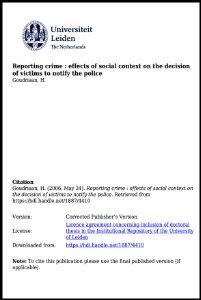By: Graham Farrell
What follows proposes a means by which to improve and accelerate police work so that it has an emphasis upon the rights and needs of victims. Using a term such as victim-oriented policing sounds like a proposal to compete with community policing or problem-oriented policing, but it is not. As proposed here, it would be entirely the fact that the concerns of victims should underpin a great deal of police work - more so than they do at present. it would be a complement to, rather than a substitute for, such approaches to policing.
The main proposal of this paper is that a simple means to promote victim-oriented policing (the term is broadly defined later) may be via an emphasis upon the policing and prevention of repeat victimization. For present purposes, repeat victimization is defined as the repeated criminal victimization of a person or place, or a target however defined. it is now well known that a small proportion of victims experience a significant proportion of all crime because they experience repeat victimization (see e.g. Skogan 1999; Friedman and Tucker 1997; Davis, Taylor, and Titus 1997; Pease 1998). Hence, to cut a long story short, preventing repeat victimization holds the potential to prevent crime. it helps victims in a practical and fundamental manner: Ezzat Fattah suggests that “Healing, recovery, redress, and prevention of future victimization are the primary objectives of most crime victims” (Fattah 1997: 270)
The focus here is upon the implications for police work with victims. While the phenomenon of repeat victimization presents a potentially wide range of implications for research and practice, for different areas of the criminal justice system, the work of community agencies and individuals, these areas are not the focus here.
International Symposium on Victimology, pp. 196-212





